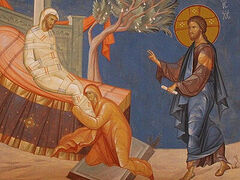One day upon the earth, at the gates of the city of Nain, the creative word of Christ the Savior sounded out, saying, Weep not (Luke 7:13). Calamities and tears in human life are inevitable. How many talented, heroically-minded people have labored to transform the world! How much suffering has been endured, blood shed, and lives given to forever rid the world of sorrow and grief! Yet tears have flowed and continue to flow. People suffer in many places on our planet from social evils, from the imperfections of human society, from personal and communal woes. The evangelist Luke tells us of one human sorrow today. A poor widow loses her only son, the sole joy in her life and her support in old age. Those around her, who have come to accompany her son on his final journey, sympathize with her. The Lord had compassion on her and said to her grieving and weeping soul, Weep not.
Such words are often spoken by people to one another in an attempt to comfort and ease sorrow. But these words cannot stop tears. Only the Lord, in whose hand the whole world and all human lives are held, has the authority and miraculous power to fully help a person. The faithful turn to Him, firmly believing in Him and hoping for His omnipotent Divine help. Man alone cannot overcome and conquer evil. Evil entered the world as its element, as a terrible force. Believing people accept calamities in their lives as God’s will, as Divine permission for our edification and salvation. At the moment when there is no more hope, people turn to God. We believe that the Lord helps everyone who calls upon Him.
The most terrible yet inevitable calamity in life is death. That is why today, alongside the words, Weep not, we hear the miraculous words of Christ the Savior: Young man, I say unto thee, Arise! And he that was dead sat up and began to speak; and Jesus delivered him to his mother (Luke 7:14–15).
Why does the Lord raise the young man, the son of the poor widow of Nain, from the dead? For, sooner or later, the young man must nevertheless die. What is the purpose of this delay? It is that in this act, as a miraculous deed of Christ the Savior, lies our Christian assurance of the universal resurrection by the command of God, by the voice of the archangel. Death, by God’s will, is unavoidable for all people. The saints were no exceptions. The most honorable Cherub, the Mother of God, tasted death, and Christ Himself accepted death for our salvation. By His example, through His glorious resurrection, Christ has witnessed the reality of the universal resurrection to the world. There is nothing surprising in this, we may say, for He is the Lord, the Master of life. He rose from the dead, but He is God! And so, during His earthly life, through the example of those who are mortal like us, Christ demonstrates His power and authority. The Lord has repeatedly raised the dead. The Holy Gospel speaks of this. The Lord raised the young man, the son of the poor widow of Nain, to assure us of the reality of resurrection. In this light, death is seen by a Christian as a birth into a new, eternal, and immortal life. A person is given life not just for the period from birth to death but forever, eternally. Just as a seed is sown in the ground to bring forth a new plant and fruit, so too does a person’s soul go to heaven, while their body goes to the earth—then to come alive again, to resurrect. All will arise. Not only souls, but also bodies will arise for a new, eternal life. Affirming the fact of resurrection by Christ, the fact of the resurrection of the widow of Nain’s son, we joyfully and confidently confess in the Symbol of Faith: “I look for the resurrection of the dead, and the life of the world to come.”
Amen.




